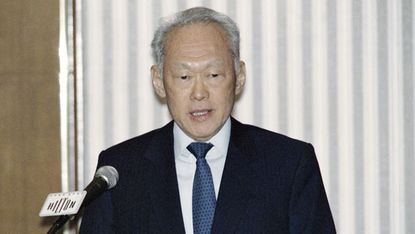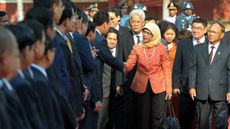Lee Kuan Yew: 'iron-willed' founder of Singapore dies at 91
'Those who love him will mourn his passing... Those who hate him will curse the day he was born'

Lee Kuan Yew, the founding father of Singapore, died today at the age of 91, prompting seven days of national mourning.
He has been hailed as the leader of Singapore's transformation from a small seaport into one of the wealthiest nations in the world, but his 31 years as the city-state's prime minister were not without controversy.
In a televised address, Lee's son, Prime Minister Lee Hsien Loong, said his father "fought for our independence, built a nation where there was none and made us proud to be Singaporeans".
Subscribe to The Week
Escape your echo chamber. Get the facts behind the news, plus analysis from multiple perspectives.

Sign up for The Week's Free Newsletters
From our morning news briefing to a weekly Good News Newsletter, get the best of The Week delivered directly to your inbox.
From our morning news briefing to a weekly Good News Newsletter, get the best of The Week delivered directly to your inbox.
But The Guardian points out that stability and economic progress were, for Lee, "unequivocally higher priorities than western notions of freedom".
He co-founded the People's Action Party (PAP), which has governed Singapore since 1959, overseeing Singapore's independence from Britain and separation from Malaysia. However, his overseas critics were often sued for defamation and his domestic critics overpowered by every legalistic means at his government's disposal.
"Being liked was not part of his agenda," says the newspaper. "A combination of high intelligence and unswervable determination were Lee's characteristics, and he transferred them, at least superficially, to modern Singapore."
The Daily Telegraph says that, on the whole, Singaporeans appeared content to "pay the price" for prosperity and relative harmony. "The price was an absence of anything resembling free political debate, and enforced obedience to Lee Kuan Yew's all-encompassing diktats on personal behaviour."
This ranged from fines for spitting, swearing and failing to flush public toilets, to capital punishment for drug traffickers and armed robbers.
"Yet Lee was never a tyrant," says the Telegraph. "His authoritarian instincts were mitigated by intellectual rigour, patent incorruptibility and a modest personal lifestyle."
The South China Morning Post says Lee had "little patience for civil liberties that might get in the way of decisive government", forcing racial integration and pushing citizens to marry and procreate. He ruled with an "iron will" that intruded heavily into people's lives and earned Singapore the reputation of a "nanny state", says the newspaper, although Lee himself said the reputation was one he was "proud to have fostered".
Singapore's Strait Times says Lee's ultimate arbiter was "what works" and what furthered Singapore's interests. "He insisted that he would not rule by opinion polls, rejecting the idea that popular government entailed a need to be popular through his term, believing that voters would come round when they eventually saw the results of policies he had pushed through," says the newspaper.
The Asian Correspondent concludes: "Those who love him will mourn his passing and celebrate his life. Those who hate him will celebrate his death and curse the day he was born… But somewhere deep inside, all of us will know that things will never be the same again in Singapore after Lee Kuan Yew."
Create an account with the same email registered to your subscription to unlock access.
Sign up for Today's Best Articles in your inbox
A free daily email with the biggest news stories of the day – and the best features from TheWeek.com
-
 'Good riddance to the televised presidential debate'
'Good riddance to the televised presidential debate'Instant Opinion Opinion, comment and editorials of the day
By Harold Maass, The Week US Published
-
 Caitlin Clark the No. 1 pick in bullish WNBA Draft
Caitlin Clark the No. 1 pick in bullish WNBA DraftSpeed Read As expected, she went to the Indiana Fever
By Peter Weber, The Week US Published
-
 Today's political cartoons - April 16, 2024
Today's political cartoons - April 16, 2024Cartoons Tuesday's cartoons - sleepyhead, little people, and more
By The Week US Published
-
 Instant Opinion: EU is ‘no defender of workers’ rights’
Instant Opinion: EU is ‘no defender of workers’ rights’In Depth Your guide to the best columns and commentary on Friday 25 October
By The Week Staff Published
-
 The most powerful passports in the world
The most powerful passports in the worldIn Depth UK slides down the list for hassle-free access as Asian nations lead
By The Week Staff Last updated
-
 RIP Inuka: Singapore’s ‘tropical polar bear’ dies aged 27
RIP Inuka: Singapore’s ‘tropical polar bear’ dies aged 27In Depth Bear was beloved by island nation - but many questioned ethics of his captivity
By The Week Staff Published
-
 Pet parrot escapes jaws of death by inches after python scare
Pet parrot escapes jaws of death by inches after python scareSpeed Read Singapore man hailed for calm reaction after finding giant snake coiled around pet bird's cage
By The Week Staff Published
-
 Singaporeans elect president without a single vote
Singaporeans elect president without a single voteSpeed Read New rules on race and wealth meant only one candidate was eligible for next week's election
By The Week Staff Last updated